| Matthew 8:26 | |
|---|---|
← 8:25 8:27 → | |
 "Christ on the Sea of Galilee". Eugène Delacroix (1854) | |
| Book | Gospel of Matthew |
| Christian Bible part | New Testament |
Matthew 8:26 is a verse in the eighth chapter of the Gospel of Matthew in the New Testament.
| Matthew 8:26 | |
|---|---|
← 8:25 8:27 → | |
 "Christ on the Sea of Galilee". Eugène Delacroix (1854) | |
| Book | Gospel of Matthew |
| Christian Bible part | New Testament |
Matthew 8:26 is a verse in the eighth chapter of the Gospel of Matthew in the New Testament.
In the original Greek according to Westcott-Hort this verse is:
In the King James Version of the Bible the text reads:
The New International Version translates the passage as:
For a collection of other versions see BibleHub Matthew 8:26.
This statement, "O ye of little faith?" Matthew records before the miracle, but Mark and Luke afterwards. MacEvilly notes that the statement was appropriate for, "they had on board the Lord God, whose Divine eye never sleeps." [1]
Then Jesus rebukes. In Greek this is ἐπετίμησε which corresponds to the Hebrew גער gaar. In Mark we have Jesus telling the sea literally, "Be silent, be muzzled."
Most commentators take the boat as a figure of the church which is persecuted by the turbulent, stormy world. [2]
Adamantius (Pseudo-Origen): "O ye true disciples! ye have the Saviour with you, and do ye fear danger? Life itself is among you, and are ye afraid of death? They would answer, We are yet children, and weak, and are therefore afraid; whence it follows, Jesus saith unto them, Why are ye afraid, O ye of little faith? As though He had said, If ye have known me mighty upon earth, why believe ye not that I am also mighty upon the sea? And even though death were threatening you, ought ye not to support it with constancy? He who believes a little will be reasoned with; he who believes not at all will be neglected." [3]
Chrysostom: "If any should say, that this was a sign of no small faith to go and rouse Jesus; it is rather a sign that they had not a right opinion concerning Him. They knew that when wakened He could rebuke the waves, but they did not yet know that He could do it while sleeping. For this cause He did not do this wonder in the presence of the multitudes, that they should not be charged with their little faith; but He takes His disciples apart to correct them, and first stills the raging of the waters. Then he arose, and rebuked the winds and the sea, and there was a great calm." [3]
Jerome: "From this passage we understand, that all creation is conscious of its Creator; for what may be rebuked and commanded is conscious of the mind commanding. I do not mean as some heretics hold, that the whole creation is animated—but by the power of the Maker things which to us have no consciousness have to Him." [3]
Adamantius (Pseudo-Origen): "Therefore He gave commandment to the winds and the sea, and from a great storm it became a great calm. For it behoves Him that is great to do great things; therefore He who first greatly stirred the depths of the sea, now again commands a great calm, that the disciples who had been too much troubled might have great rejoicing." [3]
Chrysostom: "Observe also that the storm is stilled at once entirely, and no trace of disturbance appears; which is beyond nature; for when a storm ceases in the course of nature, yet the water is wont to be agitated for some time longer, but here all is tranquillity at once. Thus what is said of the Father, He spake, and the storm of wind ceased, (Ps. 107:25.) this Christ fulfilled in deed; for by His word and bidding only He stayed and checked the waters. For from His appearance, from His sleeping, and His using a boat, they that were present supposed Him a man only, and on this account they fell into admiration of Him; And the men marvelled, saying, What manner of man is this, for the winds and the sea obey him?" [3]

Jesus walking on the water, or on the sea, is recorded as one of the miracles of Jesus recounted in the New Testament. There are accounts of this event in three Gospels—Matthew, Mark, and John—but it is not included in the Gospel of Luke. This story, following the miracle of the feeding of the five thousand, tells how Jesus sent the disciples by ship back to the "other side" of the Sea of Galilee while he remained behind, alone, to pray. Night fell and the sea arose as the ship became caught in a wind storm. After rowing against the wind for most of the night, the disciples saw Jesus walking on the water. They were frightened, thinking that they were seeing a spirit, but when Jesus told them not to be afraid, they were reassured. After Jesus entered the ship, the wind ceased, and they arrived at land.
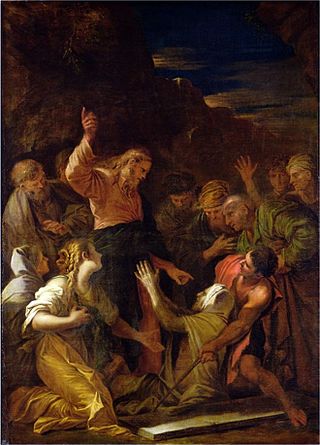
Matthew 8:4 is the fourth verse of the eighth chapter of the Gospel of Matthew in the New Testament. This verse concludes the miracle story of Jesus cleansing a leper, the first of a series of miracles in Matthew.

Matthew 9:6 is the sixth verse in the ninth chapter of the Gospel of Matthew in the New Testament.
Matthew 9:28 is a verse in the ninth chapter of the Gospel of Matthew in the New Testament.
Matthew 9:13 is a verse in the ninth chapter of the Gospel of Matthew in the New Testament.
Matthew 9:14 is a verse in the ninth chapter of the Gospel of Matthew in the New Testament.

Matthew 10:5 is the fifth verse in the tenth chapter of the Gospel of Matthew in the New Testament. In sending out the apostles on their first mission, Jesus directs them as to where they are not to go.
Matthew 9:24 is a verse in the ninth chapter of the Gospel of Matthew in the New Testament.

Matthew 12:3 is the third verse in the twelfth chapter of the Gospel of Matthew in the New Testament.
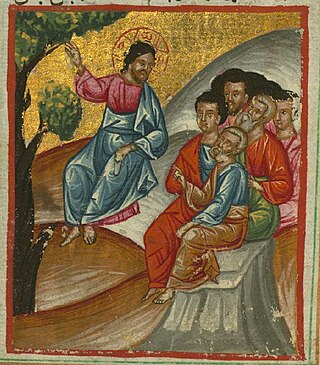
Matthew 8:20 is the 20th verse in the eighth chapter of the Gospel of Matthew in the New Testament of the Christian Bible. It reveals the homelessness of Jesus and his followers.
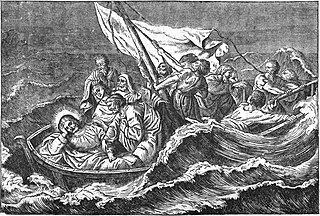
Matthew 8:23 is the 23rd verse in the eighth chapter of the Gospel of Matthew in the New Testament of the Christian Bible.
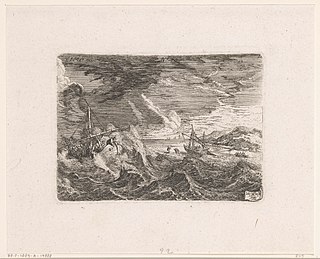
Matthew 8:24 is the 24th verse in the eighth chapter of the Gospel of Matthew in the New Testament.

Matthew 8:27 is a verse in the eighth chapter of the Gospel of Matthew in the New Testament.

Matthew 14:31 is a verse in the fourteenth chapter of the Gospel of Matthew in the New Testament.

Matthew 14:30 is the 30th verse in the fourteenth chapter of the Gospel of Matthew in the New Testament.
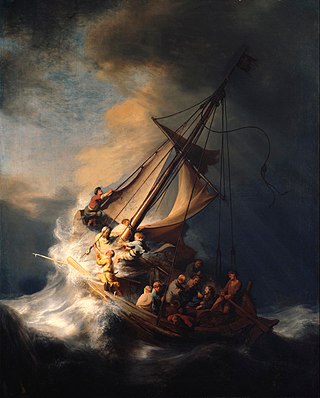
Calming the storm is one of the miracles of Jesus in the Gospels, reported in Matthew 8:23–27, Mark 4:35–41, and Luke 8:22–25. This episode is distinct from Jesus' walk on water, which also involves a boat on the lake and appears later in the narrative.

The exorcism of a boy possessed by a demon, or a boy with a mute spirit, is one of the miracles attributed to Jesus reported in the synoptic Gospels, involving the healing of a demonically possessed boy through exorcism. It is in all Synoptic Gospels: Mark 9:17-29, Matthew 17:14-21, Luke 9:40-44. In the Gospel narratives, this healing takes place following the Transfiguration.
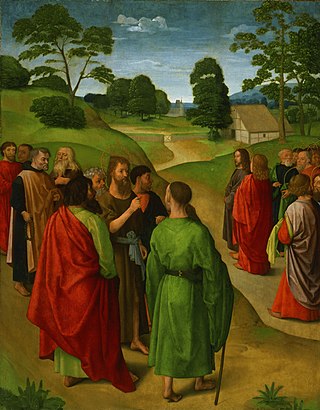
John 1:37 is the 37th verse in the first chapter of the Gospel of John in the New Testament of the Christian Bible.

John 1:38 is the 38th verse in the first chapter of the Gospel of John in the New Testament of the Christian Bible.

John 1:39 is the 39th verse in the first chapter of the Gospel of John in the New Testament of the Christian Bible.
| Preceded by Matthew 8:25 | Gospel of Matthew Chapter 8 | Succeeded by Matthew 8:27 |